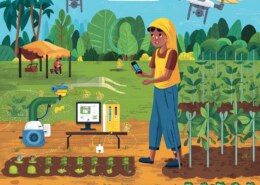How mushroom can be a component of IFS?
Agriculture 4.0 refers to the integration of advanced technologies and innovative practices in the agricultural sector, marking the fourth major agricultural revolution. This concept leverages digital tools, automation, and data-driven approaches to enhance productivity, efficiency, and sustainabiliRead more
Agriculture 4.0 refers to the integration of advanced technologies and innovative practices in the agricultural sector, marking the fourth major agricultural revolution. This concept leverages digital tools, automation, and data-driven approaches to enhance productivity, efficiency, and sustainability in farming.
Key Components:
1. Precision Agriculture: Utilizes GPS, IoT sensors, and drones to monitor and manage crops with high accuracy, optimizing inputs like water, fertilizers, and pesticides.
2. Big Data and Analytics: Collects vast amounts of data from various sources (weather, soil, crop health) to make informed decisions, predict trends, and improve yields.
3. Automation and Robotics: Deploys autonomous tractors, robotic harvesters, and automated irrigation systems to reduce labor costs and increase operational efficiency.
4. Artificial Intelligence (AI): AI algorithms analyze data to provide insights, predict crop diseases, and suggest optimal farming practices.
5. Internet of Things (IoT): Connects devices and sensors to create a network that continuously monitors farm conditions and automates processes.
Benefits:
1. Increased Productivity: Optimizes resource usage, leading to higher crop yields and reduced waste.
2. Sustainability: Minimizes environmental impact through efficient resource management and reduced chemical use.
3. Cost Efficiency: Lowers operational costs through automation and precise input management.
4. Resilience: Enhances the ability to respond to challenges like climate change and market fluctuations.
Agriculture 4.0 represents a transformative approach to farming, aiming to meet the growing global food demand while ensuring environmental sustainability and economic viability.
See less

Mushrooms can be a valuable component of an Integrated Farming System (IFS) due to their ability to enhance sustainability and diversify farm income. They thrive on agricultural waste, such as straw and husks, converting these by-products into high-value protein sources. This not only reduces wasteRead more
Mushrooms can be a valuable component of an Integrated Farming System (IFS) due to their ability to enhance sustainability and diversify farm income. They thrive on agricultural waste, such as straw and husks, converting these by-products into high-value protein sources. This not only reduces waste but also adds a profitable crop to the farm’s portfolio.
Mushroom cultivation is environmentally friendly, requiring minimal space and resources compared to traditional crops. It improves soil health by increasing organic matter and promoting beneficial microbial activity. Integrating mushrooms with livestock and crop production can create a synergistic effect, where the waste from one component serves as a resource for another.
Moreover, mushrooms are a nutritious food source rich in vitamins, minerals, and antioxidants, contributing to food security. By incorporating mushroom farming, farmers can enhance biodiversity, improve resource use efficiency, and increase resilience against market fluctuations.
Thus, mushrooms offer a sustainable and profitable addition to IFS, promoting ecological balance and economic stability.
See less